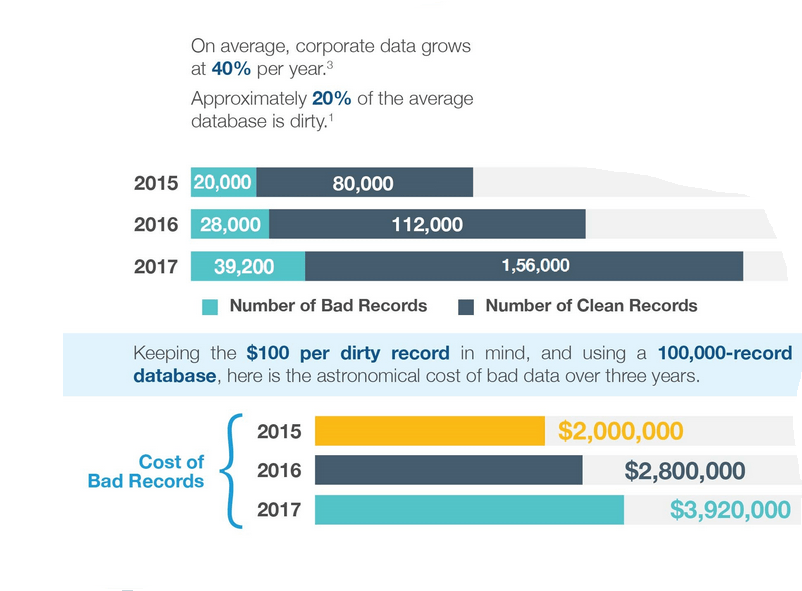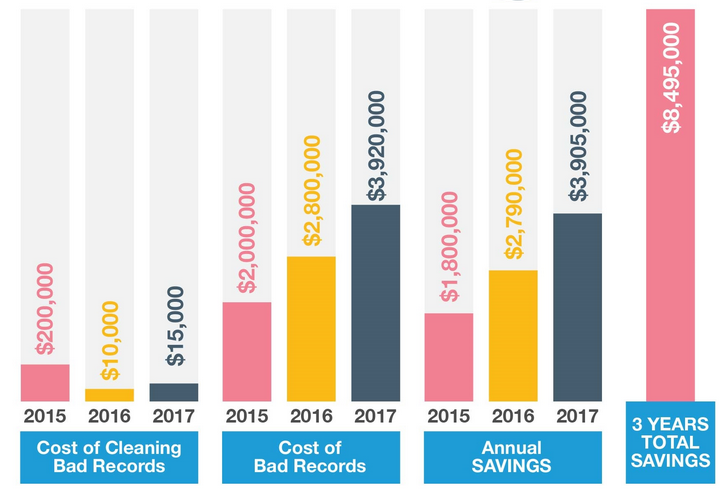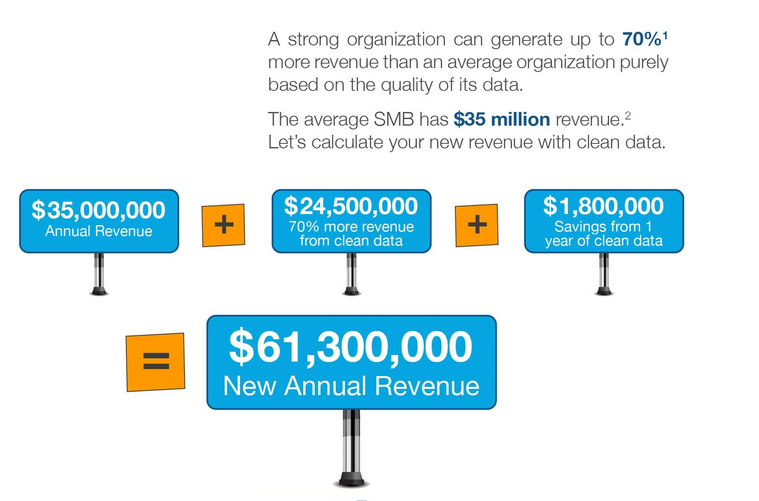
08 Jul How Much is Bad Data Costing Your Company?
[ad_1]
In a world of big data, bad data is becoming more and more commonplace. Part of the issue is fueled by the technology we use to help manage and organize that data. In our rush to be more on-demand, personalized and data-science-powered, we’ve embraced cloud computing, mobility, social collaboration and enhanced analytics. Every scrap of every shred of customer data is valuable. But in doing so, we’ve also let our data quality control lapse.
And when departments are clamoring for numbers despite the inaccuracies, it leads to a ripple effect of poor decisions based on those errors. But just how much is it really costing us? And what can we do to stop poor data hygiene before it spreads? Let’s take a closer look:
A Company Problem – Not Just an IT Problem
Even just a few years ago, in 2013, the looming spectre of bad data was apparent. Gartner surveyed a wide range of companies in its study and learned that data quality costs them over $14 million dollars a year. Now imagine how much more connected we are today and you can see how the problem could compound exponentially.
Source: Ringlead
Many companies, in an attempt to wrangle departments to make sense of it all, place the task of organizing and managing all this information squarely on IT’s shoulders. But bad data affects more than just servers and databases – it affects everyone. In this day and age, it is very much a business problem.
And that’s not even factoring in the cost beyond customer data. A few inaccuracies in customer names or details is one thing. But oftentimes, depending on the company culture in relation to data upkeep, it can affect other areas of business as well – productivity, security and making cost effective decisions.
In short, this is not a problem we can continue to throw money at and hope it goes away or works itself out.
What Exactly Is “Data Quality”?
Before you begin to get a handle on the data itself, it’s important to understand what “it” is. According to another Gartner study, data quality is examined by several different points, including:
- Existence (does the organization have the data to begin with?)
- Validity (are the values acceptable?)
- Consistency (when the same piece of data is stored in different locations, do they have the same values?)
- Integrity (how accurate the relationships between data elements and data sets are)
- Accuracy (whether the data accurately describes the properties of the object it is meant to model)
- Relevance (whether or not the data is appropriate to support the objective)
That’s a lot of information to try and clean up “by hand”.
A Portfolio of Options
To help meet the rising urgency of this challenge, there are many data cleansing solutions available. These companies typically look at the big picture of data quality and help to standardize records as a whole. They often source data internally and externally to help maximize relevance and consistency across the board.
As with the other tools in your business arsenal, it’s a smart idea to have a portfolio of options available for your data cleansing needs. You may only need a one-time data cleanse to keep your information up-to-date, or you may need ongoing work. Ideally, you’d only need a one-time data quality cleanup if you’re migrating to another system or doing a mass marketing campaign. Otherwise if the information isn’t tended to often, it can deteriorate and compound problems considerably.
For particularly large or error-prone data sets, a data quality cleansing tool may be set up to run automatically. These types of systems can either cleanse data at specific intervals or notify managers and staff in cases where ongoing data quality monitoring is important.
What to Look For in a Data Quality Solution Provider
Because there are so many options available, and more tools being created all the time, it can feel overwhelming to try and narrow down your options when you’re not even really sure what you need. No matter what you ultimately decide, the proposed solution absolutely must be able to:
- Be able to deliver an immediate impact and noticeable improvement based on the company’s current data hygiene state
- Leverage both real-time information and historical details – customers, staff, products, techniques and processes
- Have a rock-solid foundation to be able to use new technologies such as predictive analytics, forecasting and modeling
- Scale and adapt based on the volume, speed and variety of data while keeping everything valid and consistent
And just as the cost of bad data can continue to multiply year over year, the savings from having accurate data are just as big (if not more-so), as noted in this chart from RingLead:
Source: Ringlead
What a Difference Clean Data Can Make!
Of course, cost savings are one thing, but oftentimes management (and other executives) don’t just want savings – they want to see a direct correlation in terms of revenue as well. The real question is, how much can clean data make for us? Here’s a hypothetical (albeit very realistic) example from the same Ringlead chart:
And in addition to revenues and savings, the benefits of clean data go much farther. With greater data reliability comes greater credibility and a stronger decision-making foundation backed by data. Reports become more accurate. Customers respond to more accurate personalization. All departments enjoy greater productivity and efficiency. It’s a cycle of wins.
So as you can see, a few inaccurate records or non-standardized entries don’t seem like a big problem, but as your business scales, more and more information becomes fragmented and fraught with issues. Costs escalate. Efficiency plummets. But by the same token, by spending a little now, you reap far greater benefits over time. And any campaign started or improved based on solid, reliable information is one you can look to time and time again for greater insights and metrics that count.
Do you use a data hygiene strategy in your own company? How has it worked out for you? Have you seen better performance as a result or is the jury still out when it comes to making an impact? Share your stories with us in the comments below.
About the Author: Sherice Jacob helps business owners improve website design and increase conversion rates through compelling copywriting, user-friendly design and smart analytics analysis. Learn more at iElectrify.com and download your free web copy tune-up and conversion checklist today! Follow @sherice on Twitter, LinkedIn or Google+ for more articles like this!
[ad_2]
Source link
Social Media Agency, Social Media, Digital Marketing, Digital Marketing Agency, Search Engine Marketing, SEO, digital marketing agency dubai, video content marketing, crossfit marketing dubai, video marketing dubai, digital marketing agency abu dhabi, facebook marketing dubai, facebook marketing abu dhabi, digital marketing agencies in dubai, social media agency, content marketing dubai, content strategy dubai, branding dubai



